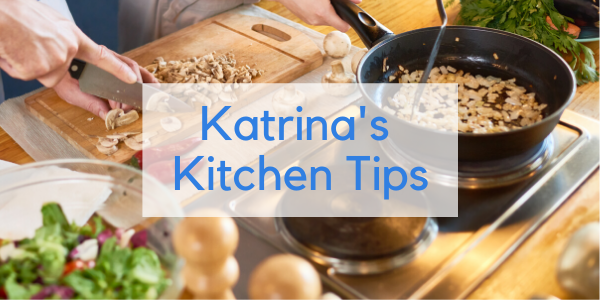
Katrina’s Kitchen Tips
With the holidays coming up, in a recent Friday support group call, we focused on all things cooking and kitchen safety. While the kitchen could be considered one of the more risk-laden rooms in the house, there are a few simple strategies and kitchen tools that can help make kitchen tasks safe and fun.
Like in most other circumstances, the kitchen is an excellent place for our other senses to both assist our vision and compensate for vision loss. The sense of smell and the sense of hearing are particularly helpful in keeping a person safe in the kitchen. For example, turning on a gas stove can be an auditory activity that includes listening for the clicking of the igniter and the ultimate catch of the gas. Considering the same appliance, our sense of smell can alert us to when a burner has not been properly shut off through the smell of the gas.
Take for example the problem of identifying spoiled milk, while the expiration date might be impossible to read, spoiled milk has a very distinct smell and a person could make it a habit to always smell milk before pouring.
There are also a variety of tools that can assist in keeping a person with vision loss safe in the kitchen. The oven, and a concern for burning one’s skin, can be easily addressed through the right heat resistant protective gear. The use of an oven glove that allows good dexterity of the fingers and can protect a significant portion of the forearm is far superior to a potholder or oven mitt. Another glove, a cut-resistant glove, is a worthy investment for protecting the fingers of the stabilizing hand while using a sharp knife for slicing or chopping. Stove knob covers can be used to protect against bumping into frontside stove controls and turning the cooktop or burner on by accident.
Of course, don\’t forget my favorite kitchen tool, the bump dot! You can use bump dots to mark regularly used settings on your microwave, stove and oven. Just feel for the raised bump dot and you will be able to set your cooking devices properly.
Vision loss does not have to limit your ability to prepare nutritious and delicious snacks and meals. If you want more specific instruction, make an appointment with our Occupational Therapist Katrina, 630-690-7115.
